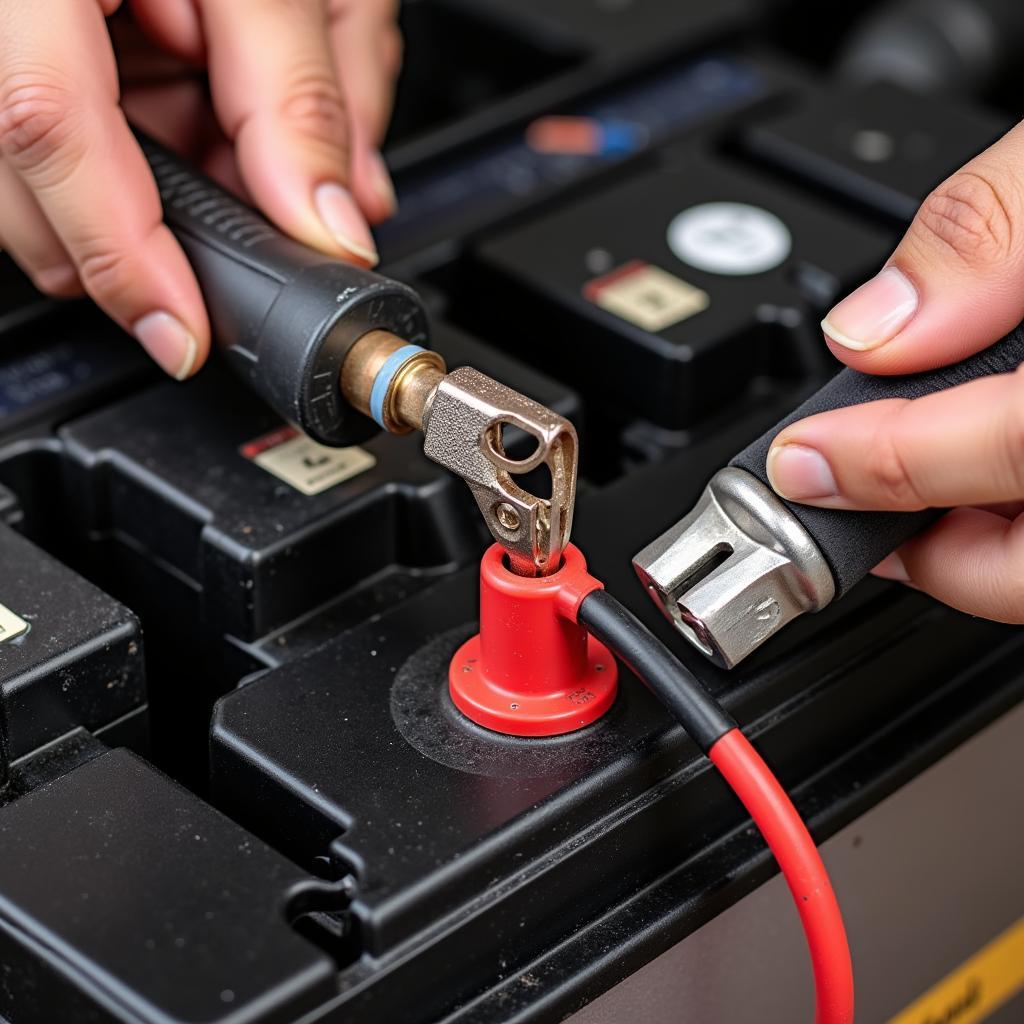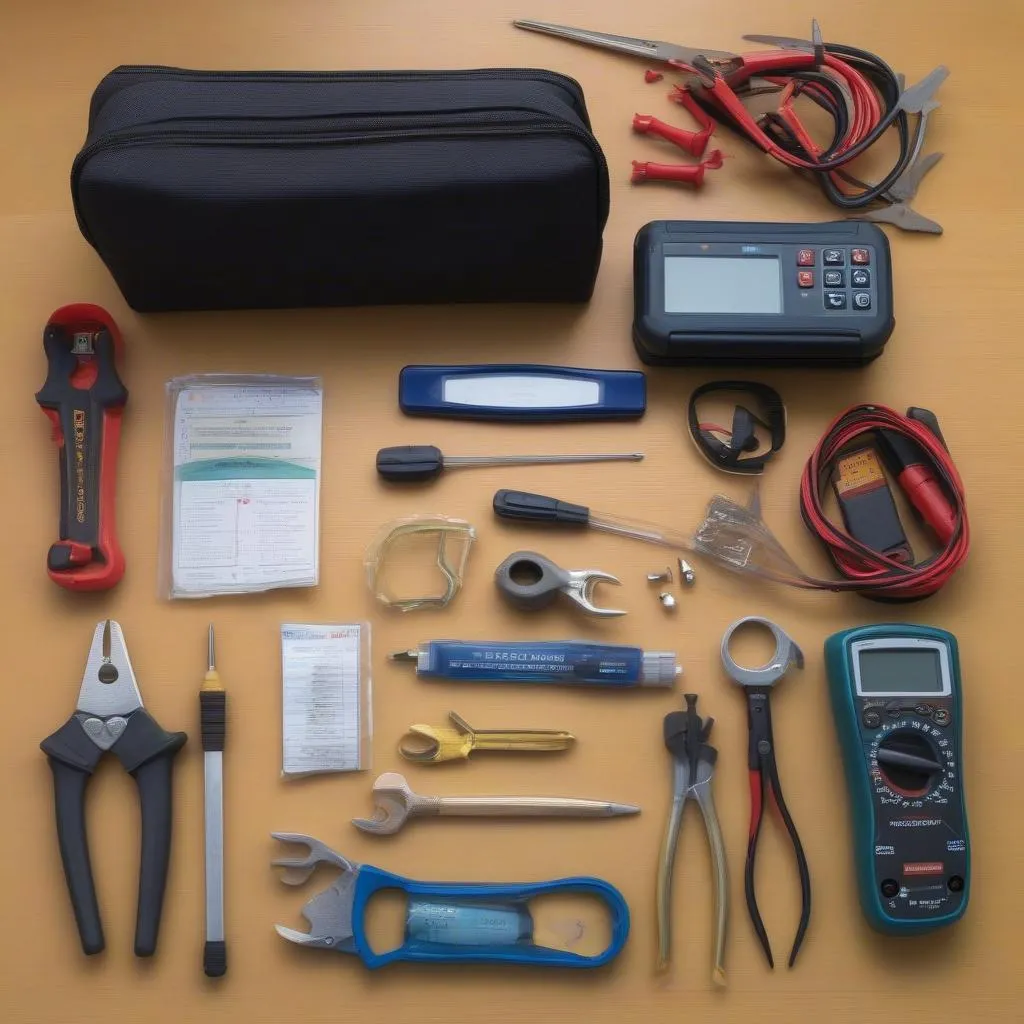You just installed a brand new battery, expecting your car to roar back to life, but it’s still stubbornly refusing to start. This can be incredibly frustrating, but don’t despair. There are several reasons why your car still won’t start with a new battery, and many are surprisingly easy to fix. This article will guide you through the most common culprits and help you get back on the road.
Common Reasons Your Car Won’t Start Even With a New Battery
While a dead battery is the most frequent cause of starting problems, it’s not the only one. A new battery doesn’t guarantee a working vehicle. Here’s a breakdown of other potential issues:
- Faulty Alternator: The alternator recharges the battery while the engine is running. A faulty alternator can drain even a new battery quickly, leaving you stranded.
- Bad Starter: The starter motor is responsible for cranking the engine. A failing starter might click, grind, or do nothing at all, even with a fully charged battery.
- Corrosion: Battery terminals and cables can corrode, preventing proper electrical flow. This can happen even with a new battery if the connections aren’t clean.
- Electrical Problems: Issues with wiring, fuses, or relays can disrupt the starting circuit and prevent the car from starting.
- Fuel System Problems: A lack of fuel, a clogged fuel filter, or a faulty fuel pump can prevent the engine from starting, regardless of the battery’s condition.
- Immobilizer System Malfunction: Modern cars have anti-theft systems that can prevent the engine from starting if there’s a problem with the key or the immobilizer system itself.
Troubleshooting a Car That Won’t Start With New Battery
Follow these steps to diagnose why your car still won’t start with new battery:
- Check the Battery Connections: Make sure the battery terminals are clean and tightly connected to the cables.
- Inspect the Alternator: Have the alternator tested to ensure it’s charging properly.
- Test the Starter: You can have the starter tested at an auto parts store or a mechanic’s shop.
- Examine the Fuses and Relays: Check the fuse box for any blown fuses related to the starting system.
- Inspect Fuel System Components: Check the fuel level, and if necessary, have the fuel pump and filter checked.
 Checking Car Battery Connections
Checking Car Battery Connections
Why is My Car Still Not Starting After Replacing the Battery and Alternator?
Even after replacing both the battery and alternator, your car might still refuse to start. This could point to other electrical issues, a faulty starter, or problems with the fuel system or immobilizer.
- Check the Starter: A faulty starter is a prime suspect if the car still won’t start after replacing the battery and alternator.
- Inspect Wiring and Connections: Carefully examine the wiring connected to the starter and other related components for any damage or loose connections.
- Fuel Delivery Issues: Ensure the fuel pump is working and delivering fuel to the engine.
“A seemingly simple problem like a car not starting can often have multiple underlying causes,” says veteran automotive technician, John Miller. “Systematic troubleshooting is key to identifying the real issue and avoiding unnecessary part replacements.”
Car Won’t Start After Jumping: Is it the Battery?
If your car won’t start even after a jump start, it suggests the problem might not be the battery itself, especially if it’s new. This could indicate a problem with the alternator, starter, or other electrical components.
- Test the Alternator: If the alternator isn’t charging properly, the jump start will only provide temporary power.
- Inspect the Starter: A faulty starter won’t engage even with external power from a jump start.
“Don’t automatically assume the battery is the culprit,” advises automotive electrical specialist, Maria Sanchez. “Many other components can mimic a dead battery symptom.”
Conclusion
A car that still won’t start with a new battery can be a puzzling problem. However, by systematically checking the components mentioned in this article, you can often pinpoint the true culprit and get your car running again. If you’re not comfortable performing these checks yourself, it’s always best to consult a qualified mechanic. Remember, a little troubleshooting can save you time and money in the long run.
FAQ
- Can a new battery be faulty? Yes, although rare, a new battery can be faulty. Have it tested to rule out this possibility.
- How long should a car battery last? Typically, car batteries last between 3 and 5 years.
- What are the signs of a bad alternator? Dim headlights, flickering interior lights, and a warning light on the dashboard are common signs.
- How can I tell if my starter is bad? Clicking, grinding, or whining noises when you turn the key are indicative of a bad starter.
- Will a bad starter drain my battery? No, a bad starter won’t drain the battery, but a bad alternator will.
- How do I clean corroded battery terminals? Use a mixture of baking soda and water with a wire brush.
- Can a bad fuel pump prevent my car from starting? Yes, if the fuel pump isn’t working, the engine won’t get the fuel it needs to start. You can check out more information about brake warning light in our article about 68 camaro brake warning light.

